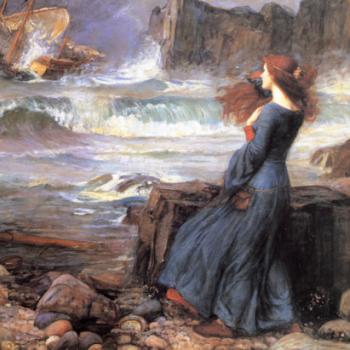Unlike Ebenezer Scrooge, the memories of my Christmas past are happy.
My parents worked hard to give us a holiday centered in Jesus and full of jollification. We went to Church, watched Christmas specials on television before video gave us even more control of our media lives, and practiced the American rituals of the season. They never pretended there was a Santa, but we enjoyed the Santa myth as fairy story. (Read Frank L. Baum on Santa!)
Ebenezer Scrooge had no such luck.
Scrooge had a distant father who blamed him for the death of his mother. On the other hand, though emotional bankrupt, Scrooge’s father did see to young Ebenezer receiving an education and found a wonderful mentor and apprentice for him in Mr. Fezziwig. It is easy to shift the blame for Scrooge’s life to his lonely childhood, but he had chances to escape. He had a chance at friendship, fellowship, and marriage, more than many of us receive. He frittered those chances away due to two demons he refused to exorcise.
He confused his sorrow and loneliness with a lack of power. Scrooge insulated himself from need, including the need for emotion and so felt safe. Sadly, this too was a feeling and so left insecurity. Any claim on something greater than personal peace and affluence had to be a fraud, a humbug in Victorian terms, because if it wasn’t the pitiable nature of his life would be revealed.
He would have purchased safety at the cost of joy. Many of us get what we want by rejecting Christ’s values in one area only to find that the cost was too high. We lay down our cross only to discover that our new burden is heavier and our new load is weighty. We gain a pleasure, but lose hope and joy with the dream of changing our hearts.
External security after all can never be guaranteed. Outside forces cannot be controlled and the richest man, the most powerful man, may find the changes of politics, his health, or the economy destroy what he once had. Fezziwig could face decline with equanimity, because he was happy inside. The martyrs learned to be happy within so martyrdom was an external curse, but an internal blessing.
Scrooge forgot that in his reading and his imagination he was free and could find happiness. If he had turned to Christ earlier, then he might have found a reality that external factors could not control.
Scrooge decided to embrace the trends of his age instead of sticking with the old ways he might have learned from Fezziwig. This might have been good business, but it was disastrous for his happiness.
Scrooge hurt other people by his own errors, but they were still able to be happy. The woman he did not marry was better off without him, at least as he became. Her life was one of meaning and joy and the only feeling left was pity. There is a lesson there for those who think that “love” is absolute and means never letting go. Sometimes love acknowledges that the beloved cannot be helped by the lover and so let’s go.
The Cratchit family was happier in their poverty than Scrooge was in plenty, because they were moral. The ultimate lesson of the Past is that it shapes, but does not control us. We should repent of our errors, but our errors do not control others either. We are not gods.
And so long as there is Christmas present, there is hope of repentance and that the past need not be a forerunner of the future. If Christmas past was bad, embrace that truth and allow it to change you. Become so happy within that nothing external can make you deeply unhappy ever again. I pray that it is true of my this Christmas. May my affections be so hidden with Christ in God that they are secure from the slings and arrows of outrageous fortune.
If the world curses, may God bless us within, every one.












